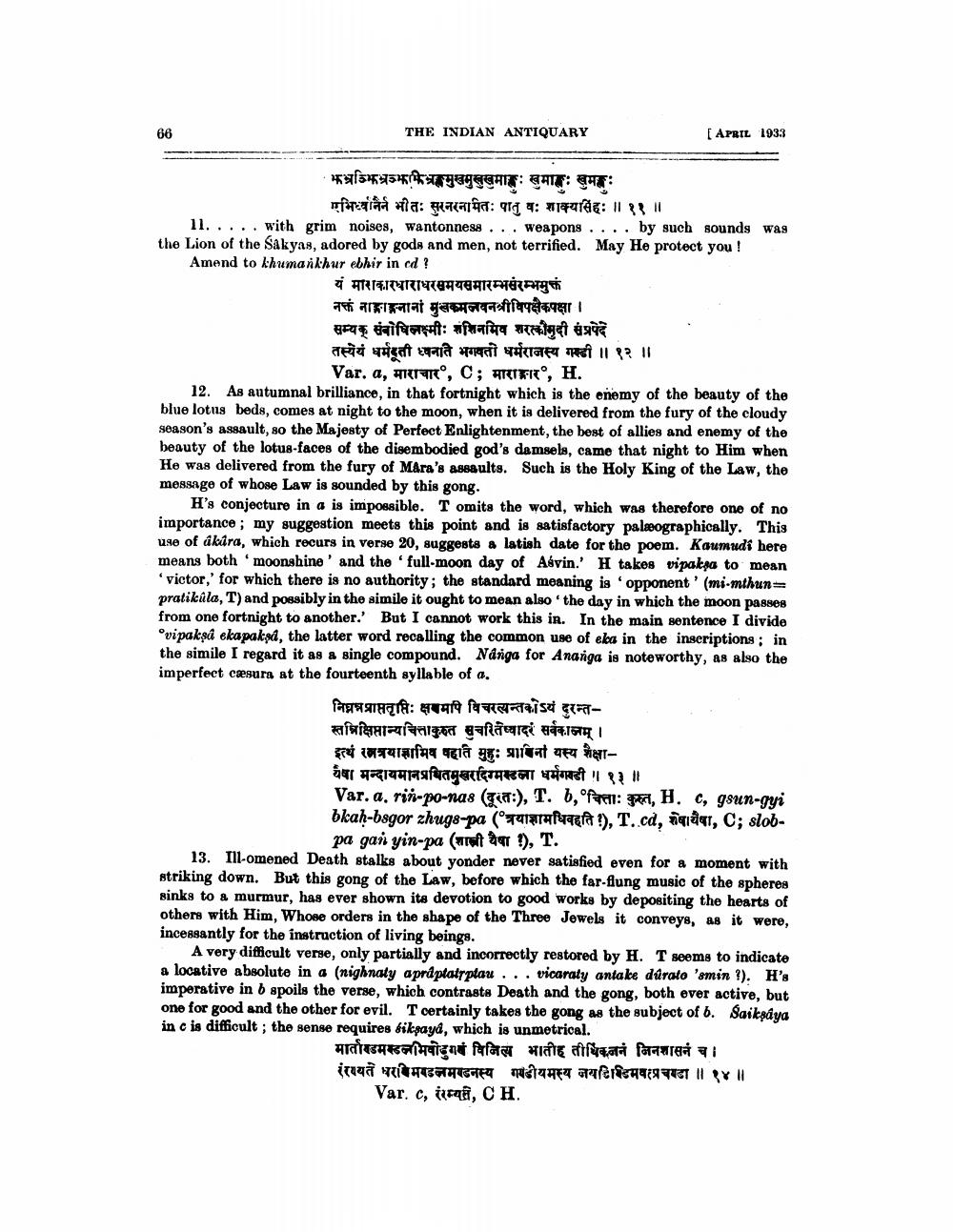________________
THE INDIAN ANTIQUARY
66
[APRIL 1933
संभ्रमिभ्रममित्रामुखमुखुखमाहः खुमारः खुमखुः
एभियान भीतः सुरनरनामतः पातु वः शाक्यसिंहः ॥ ११ ॥ 11. . . . . with grim noises, wantonness . . . weapons . . . . by such sounds was the Lion of the Sakyas, adored by gods and men, not terrified. May He protect you! Amend to khumarkhur ebhir in od ?
यं माराकारधाराधरसमयसमारम्भसंरम्भमुक्तं नक्तं नाजानानां मुखकमजवनश्रीविपक्षकपक्षा । सम्यक् संबोधिलक्ष्मीः शशिनमिव शरत्कीमुदी संप्रपेड़ तस्येयं धर्मदूती ध्वनात भगवती धर्मराजस्य गस्ती ।। १२ ।।
Var.a, माराचार', Cमाराहार', H. 12. As autumnal brilliance, in that fortnight which is the enemy of the beauty of the blue lotus beds, comes at night to the moon, when it is delivered from the fury of the cloudy season's assault, so the Majesty of Perfect Enlightenment, the best of allies and enemy of the beauty of the lotus-faces of the disembodied god's damsels, came that night to Him when He was delivered from the fury of MAra's assaults. Such is the Holy King of the law, the message of whose Law is sounded by this gong.
H's conjecture in a is impossible. T omits the word, which was therefore one of no importance; my suggestion meets this point and is satisfactory palæographically. This use of ákúra, which recurs in verse 20, suggests a latish date for the poem. Kaumudi here means both moonshine' and the full-moon day of Asvin.' H takes vipaksa to mean
victor.' for which there is no authority; the standard meaning is opponent' (mi-mthun pratiküla, T) and possibly in the simile it ought to mean also the day in which the moon passes from one fortnight to another. But I cannot work this in. In the main sentence I divide vipakså ekapakşd, the latter word recalling the common use of ela in the inseriptions : in the simile I regard it as a single compound. Nanga for Ananga is noteworthy, as also the imperfect cæsura at the fourteenth syllable of a.
निघ्नन्नप्राप्ततृप्तिः क्षयमपि विचरत्यन्तकोऽयं दुरन्तस्तनिक्षिप्तान्यचित्ताकुरुत सुचरितेष्वादरं सर्वकालम् । इत्थं रखत्रयाज्ञामिव पहात मुहुः प्राविना यस्य शैक्षायैषा मन्दायमानप्रथितमुखरदिग्महला धर्मगवडी ॥ १३ ॥ Var.a.ri-po-nas (दूरतः), T. b, चित्ताः कुरुत, H. C, gsun-gyi bkah-bsgor zhuge-pa (त्रयाज्ञामधिवहति :), T..cd, शेषायैषा, C; slob
pa gaiyin-pa (शास्त्री यैषा), T. 13. Ill-omened Death stalks about yonder never satisfied even for a moment with striking down. But this gong of the Law, before which the far-flung music of the spheres sinks to & murmur, has ever shown its devotion to good works by depositing the hearts of others with Him, Whose orders in the shape of the Three Jewels it conveys, as it were, incessantly for the instruction of living beings.
A very difficult verse, only partially and incorrectly restored by H. T seems to indicate a locative absolute in a (nighnaty aprdptatrptas . . . vicaraty antake darato 'smin ?). H'S imperative in b spoils the verse, which contrasts Death and the gong, both ever active, but one for good and the other for evil. T certainly takes the gong as the subject of 6. Saiksdya in c is difficult ; the sense requires tikpayd, which is unmetrical.
मार्ताण्डमहत्नमिवोदुगवं विनिल भातीह तीकिननं जिनशासनं च । रंगण्यते धरधिमण्डलमण्डनस्य गयडीयमस्य जयडिविडमवत्प्रचण्डा ॥ १४ ॥
Var.c, रंरम्यस, CH.




